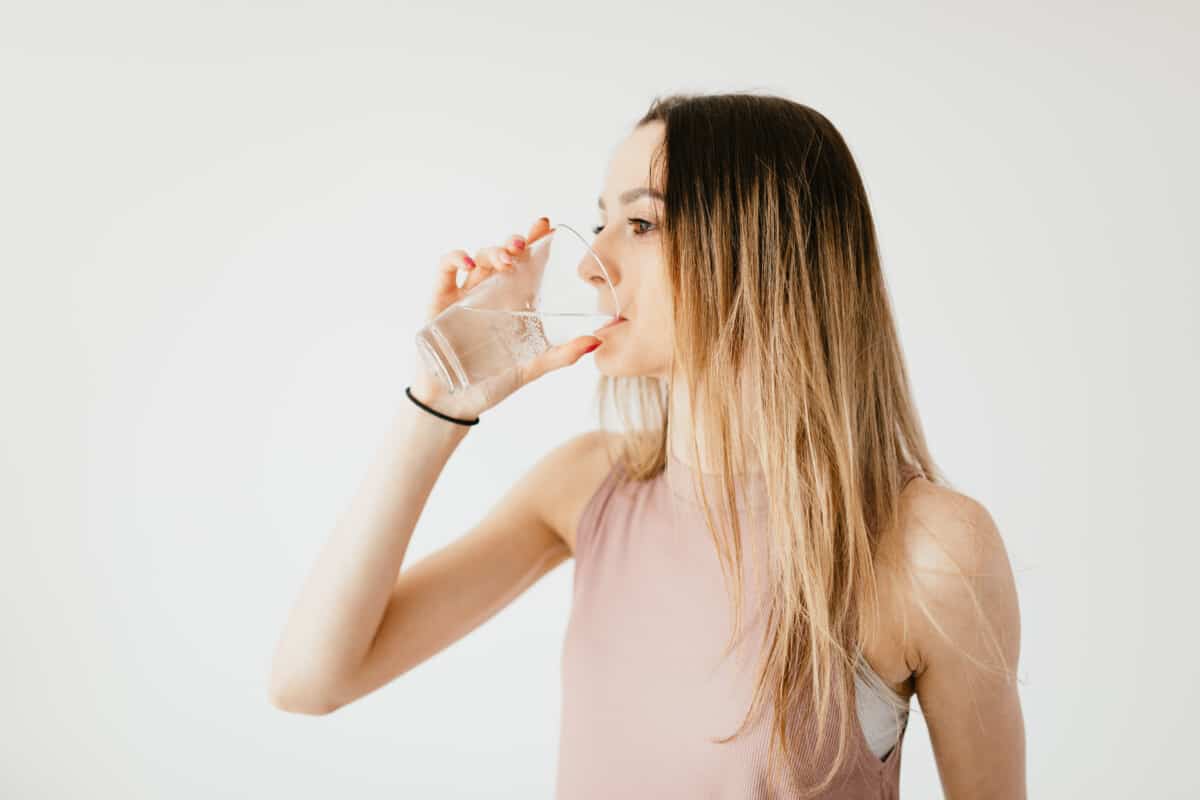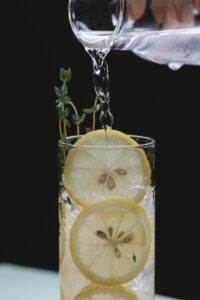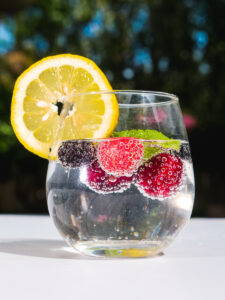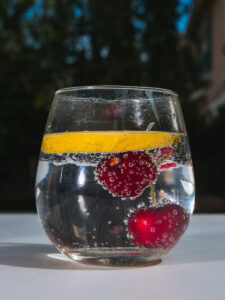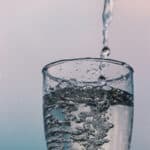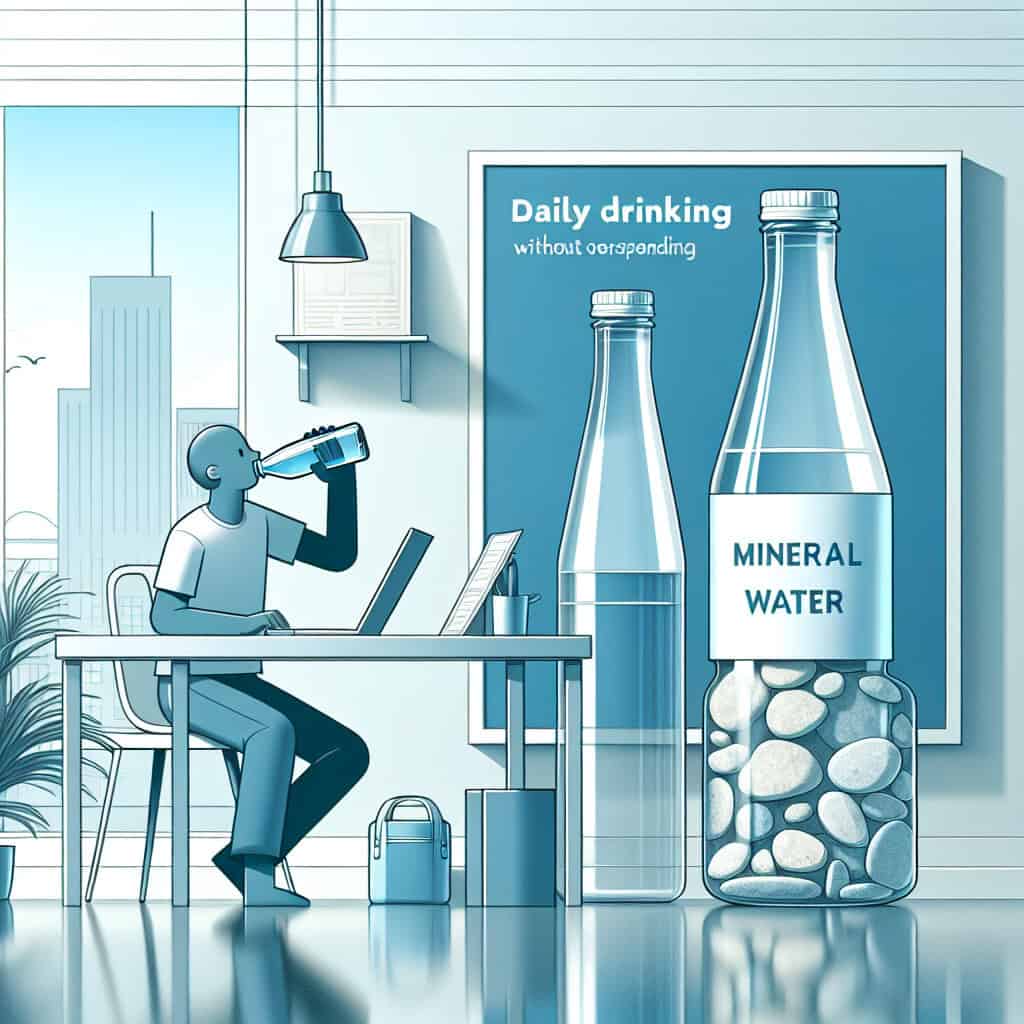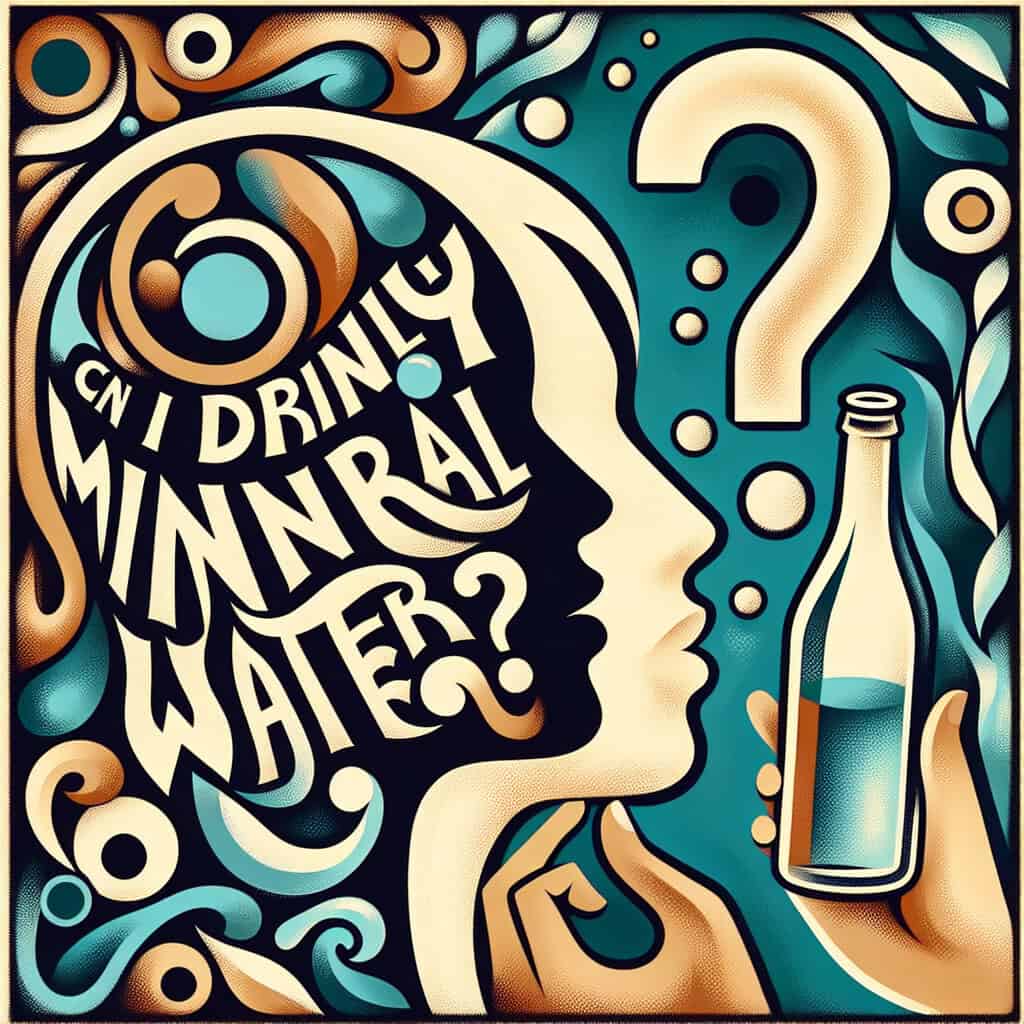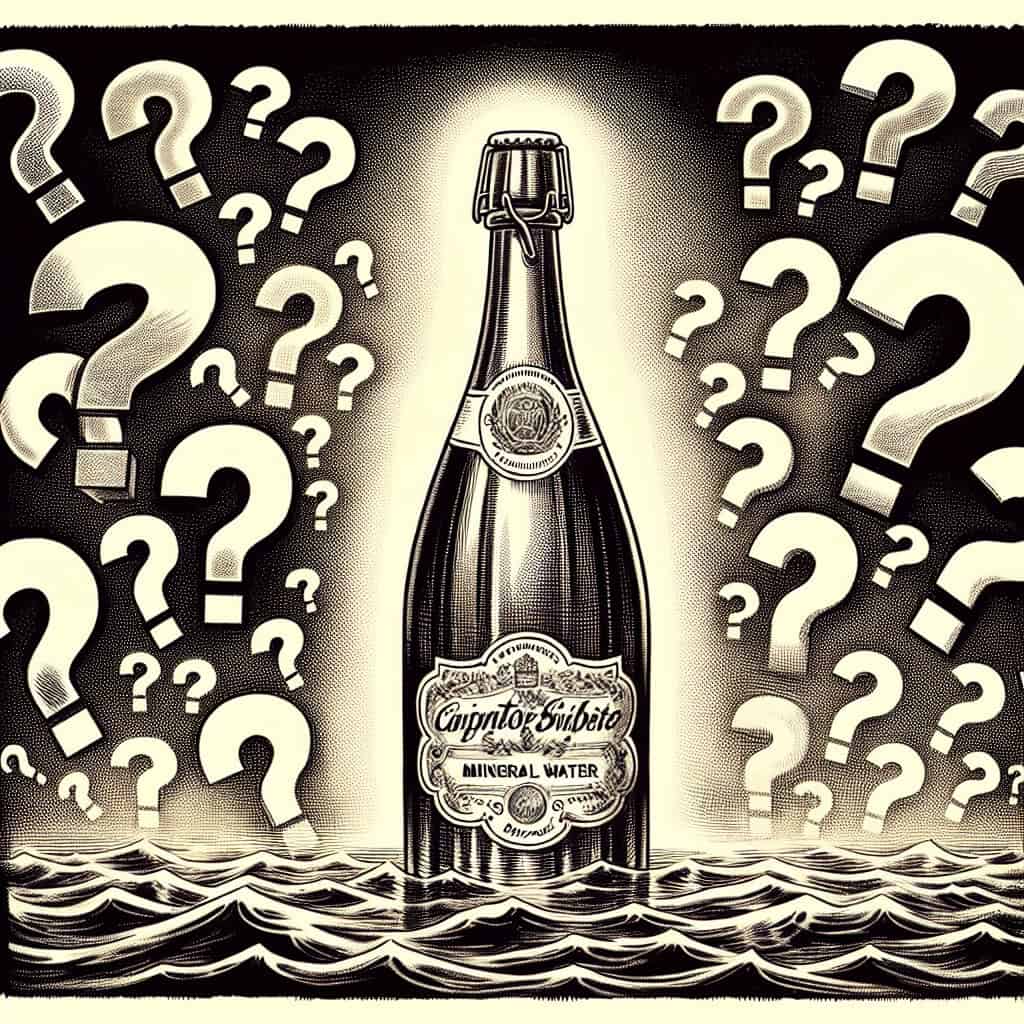Amazon Affiliate Disclaimer
As an affiliate, we earn from qualifying purchases. We get commissions for purchases made through links in this post.
Best Way to Store Mineral Water
When storing mineral water, it is important to keep it away from direct sunlight.
Sunlight can cause the water to deteriorate and develop an unpleasant taste.
UV rays can also degrade the plastic bottles, leading to the release of harmful chemicals
into the water.
Therefore, it is recommended to store mineral water in a cupboard or pantry, away from
windows or any other sources of direct sunlight.
Another factor to consider when storing mineral water is the surrounding environment.
Avoid storing it near strong-smelling substances or chemicals, as water is highly susceptible
to absorbing odors.
For instance, storing mineral water near cleaning products or strong-smelling foods like
onions or garlic can result in an unpleasant taste and odor.
It is best to store mineral water in a separate area, away from any potential sources of odor
contamination.
Furthermore, the type of container used for storing mineral water can impact its quality.
Plastic bottles are the most common choice due to their convenience and affordability.
However, it is important to select bottles that are specifically designed for storing water.
Look for bottles made from food-grade plastic, such as high-density polyethylene (HDPE) or
polyethylene terephthalate (PET).
These materials are safe and do not leach harmful chemicals into the water.
Glass bottles are another option for storing mineral water.
They are non-permeable and do not react with the water, ensuring its purity and taste.
Glass bottles also provide better insulation, keeping the water cooler for longer periods.
However, they are more fragile and can be heavier to carry
Why is Proper Storage Important for Mineral Water?
One key reason why proper storage is crucial for mineral water is to prevent contamination.
When exposed to air, water can easily become a breeding ground for bacteria, algae, and
other microorganisms.
These contaminants can not only alter the taste and odor of the water but also pose
potential health risks if consumed.
By storing mineral water in airtight containers, such as glass or BPA-free plastic bottles, you
can significantly reduce the chances of contamination.
Another aspect to consider is the impact of sunlight on mineral water.
Exposure to direct sunlight can lead to the degradation of the water’s quality.
Ultraviolet (UV) rays from the sun can cause chemical reactions within the water, resulting in
the breakdown of essential minerals and the formation of harmful compounds.
To protect mineral water from sunlight, it is advisable to store it in a cool, dark place, such
as a pantry or cupboard.
Alternatively, you can opt for opaque or tinted bottles that offer UV protection.
Temperature also plays a vital role in maintaining the integrity of mineral water.
Extreme heat or cold can affect the taste and quality of the water.
High temperatures can accelerate the growth of bacteria, while freezing temperatures can
cause the water to expand and potentially damage the container.
It is recommended to store mineral water at room temperature, ideally between 50°F (10°C)
and 70°F (21°C), to ensure optimal preservation.
Furthermore, the duration of storage should be taken into account.
While mineral water typically has a long shelf life, it is still essential to consume it within a
reasonable timeframe.
Over time, even when stored correctly, the water may lose some of its mineral content and
freshness.
Therefore, it is advisable to rotate your stock of mineral water regularly, consuming the
oldest bottles first to ensure maximum quality.
Choosing the Right Container for Storing Mineral Water
One of the best options for storing mineral water is a glass container.
Glass is non-reactive and does not leach any chemicals into the water, ensuring that its
taste remains unaltered.
Additionally, glass containers are impermeable, preventing any external contaminants from
seeping into the water.
This is particularly important when storing mineral water for an extended period.
Another suitable option for storing mineral water is a stainless steel container.
Stainless steel is durable, lightweight, and resistant to corrosion.
It does not impart any taste or odor to the water, making it an excellent choice for long-term
storage.
Stainless steel containers also offer insulation properties, keeping the water cool for a
longer duration.
Plastic containers, on the other hand, should be used with caution.
While they are convenient and lightweight, certain types of plastic can leach harmful
chemicals into the water, especially when exposed to heat or sunlight.
It is crucial to choose BPA-free plastic containers specifically designed for storing water.
These containers are made from food-grade plastic and are free from any harmful
substances.
When selecting the size of the container, consider your consumption needs and storage
space.
Smaller containers are ideal for personal use or when you need to carry water on-the-go.
They are also easier to handle and store in limited spaces.
On the other hand, larger containers are suitable for storing water for a family or during
emergencies.
It is important to ensure that the container is properly sealed to prevent any contamination
or leakage.
To further enhance the storage of mineral water, consider using specialized containers
designed for this purpose.
For example, there are containers with built-in filters that remove impurities and improve the
taste of the water.
These filters can remove chlorine, heavy metals, and other contaminants, ensuring that you
have access to clean and refreshing mineral water.
Avoid Using Containers Made of Harmful Materials
One of the best alternatives to plastic containers is glass bottles.
Glass is inert and does not react with the water, ensuring that no unwanted substances are
transferred.
Additionally, glass is non-porous, meaning it does not absorb any odors or flavors from the
water, preserving its original taste.
Glass bottles also provide a clear view of the water, allowing you to easily monitor its quality
and cleanliness.
Another safe option for storing mineral water is stainless steel containers.
Stainless steel is a durable and non-reactive material that does not leach any harmful
chemicals into the water.
These containers are also resistant to corrosion, ensuring the longevity of the stored water.
Stainless steel bottles are ideal for outdoor activities or when you need a portable option, as
they are lightweight and easy to carry.
When choosing containers, it is essential to look for those that are labeled as BPA-free or
PVC-free.
These labels indicate that the containers are made from safer materials that do not pose
any health risks.
Additionally, consider opting for containers that are specifically designed for storing water,
as they are often made with food-grade materials and undergo rigorous testing to ensure
their safety.
To further enhance the safety of storing mineral water, consider using containers with
airtight seals.
This prevents any external contaminants from entering the water and maintains its
freshness for a longer period.
Airtight seals also help in preserving the water’s mineral content and preventing any
potential oxidation.
Keep the Water Away from Direct Sunlight
To ensure that your mineral water remains fresh and pure, it is important to store it in a cool,
dark place.
This can be a pantry, cupboard, or any other area in your home that is away from direct
sunlight.
By doing so, you can prevent the water from being exposed to harmful UV rays and
maintain its quality for a longer period of time.
Additionally, sunlight can also affect the packaging of mineral water.
Plastic bottles, commonly used for storing water, are susceptible to degradation when
exposed to sunlight.
The UV rays can cause the plastic to break down, leading to the release of harmful
chemicals into the water.
This not only affects the taste but also poses potential health risks.
To illustrate the importance of keeping mineral water away from direct sunlight, let’s
consider an example.
Imagine you have two bottles of mineral water, one stored in a dark cupboard and the other
left on a sunny windowsill.
After a few weeks, you notice that the water in the bottle exposed to sunlight has a slightly
off taste and a faint odor.
On the other hand, the water stored in the dark cupboard remains fresh and pure, with no
noticeable changes in taste or odor.
This example highlights the impact of sunlight on the quality of mineral water.
Maintain a Consistent Temperature
Exposure to high temperatures can lead to the degradation of the plastic bottles, which can
result in the leaching of harmful chemicals into the water.
Additionally, heat can accelerate the growth of bacteria and other microorganisms,
compromising the safety and purity of the water.
Therefore, it is crucial to store mineral water in a location where the temperature remains
stable.
A suitable option for maintaining a consistent temperature is to store mineral water in a
pantry or cupboard.
These areas are typically shielded from direct sunlight and tend to have a more stable
temperature compared to other parts of the house.
If possible, choose a spot that is away from any heat sources, such as the stove or oven, as
they can raise the temperature in the surrounding area.
Another effective method to maintain a consistent temperature for storing mineral water is to
use a wine cooler or a dedicated beverage refrigerator.
These appliances are designed to provide a controlled environment, ensuring that the
temperature remains constant.
They often come with adjustable settings, allowing you to set the ideal temperature for
storing mineral water.
For those living in areas with hot climates or experiencing high temperatures during certain
seasons, investing in a mini-fridge or a small refrigerator solely for storing mineral water can
be a worthwhile option.
These appliances offer the advantage of precise temperature control, ensuring that the
water remains cool and refreshing.
Furthermore, it is important to note that storing mineral water in a consistent temperature
not only preserves its quality but also extends its shelf life.
By minimizing temperature fluctuations, you can prevent the growth of bacteria and the
development of off-flavors in the water, ensuring that it remains safe and enjoyable to
consume for a longer period.
Proper Handling and Hygiene Practices
To begin with, it is essential to store mineral water in a clean and sanitized environment.
This means ensuring that the storage area is free from any contaminants, such as dust, dirt,
or chemicals.
It is recommended to use airtight containers or bottles specifically designed for storing
water.
These containers should be thoroughly washed and rinsed before use, using mild soap or a
food-grade sanitizer.
Additionally, make sure to dry the containers completely to prevent the growth of bacteria or
mold.
Furthermore, it is important to handle mineral water with clean hands.
Before touching the bottles or containers, wash your hands thoroughly with soap and water.
This step is particularly crucial if you have been handling any potentially harmful substances
or if you have been in contact with surfaces that may harbor bacteria or viruses.
By maintaining proper hand hygiene, you can prevent the transfer of any contaminants to
the water.
Another aspect of proper handling is avoiding direct exposure to sunlight or extreme
temperatures.
Mineral water should be stored in a cool and dark place to maintain its quality.
Exposure to sunlight or high temperatures can lead to the degradation of the water’s taste,
odor, and overall quality.
Therefore, it is advisable to store mineral water away from windows, heaters, or any other
heat sources.
In addition to proper handling, regular monitoring of the stored mineral water is essential.
Check the bottles or containers for any signs of damage or leakage.
If you notice any issues, transfer the water to a new container to prevent contamination.
It is also recommended to label the containers with the date of storage to keep track of the
water’s freshness.
Wash Your Hands Before Handling the Water
When washing your hands, use warm water and soap, and scrub for at least 20 seconds.
Pay close attention to the areas between your fingers, under your nails, and the back of
your hands.
Rinse your hands thoroughly to remove any soap residue.
Dry your hands with a clean towel or air dry them.
By following these proper handwashing techniques, you minimize the risk of introducing any
potential contaminants to the mineral water.
Additionally, it is crucial to consider the environment where you store the mineral water.
Ensure that the storage area is clean, dry, and free from any potential sources of
contamination.
Avoid storing the water near chemicals, cleaning agents, or any other substances that may
compromise its quality.
Furthermore, keep the water away from direct sunlight and extreme temperatures, as these
factors can affect its taste and overall quality.
To further enhance the safety of the stored mineral water, consider using dedicated
containers specifically designed for water storage.
These containers should be made of food-grade materials, such as high-density
polyethylene (HDPE) or polypropylene (PP), which do not leach harmful chemicals into the
water.
Avoid using containers made of materials like PVC or polycarbonate, as they may contain
potentially hazardous substances.
Proper labeling of the stored mineral water is also essential.
Clearly mark the containers with the date of storage to ensure that you consume the oldest
water first.
This practice helps maintain a rotation system, ensuring that the water does not sit for
extended periods, which could potentially compromise its quality.
Avoid Touching the Inside of the Container
To ensure the best way to store mineral water, it is recommended to use containers with
airtight seals, such as glass or BPA-free plastic bottles.
These materials are less likely to leach harmful chemicals into the water and maintain the
freshness of the mineral water for a longer period.
Additionally, it is essential to thoroughly clean and sanitize the containers before filling them
with water.
This step helps eliminate any potential bacteria or residue that may be present.
Furthermore, it is advisable to handle the containers with clean hands or wear disposable
gloves to prevent any transfer of dirt, oils, or bacteria onto the inside surface.
Even the smallest amount of contamination can affect the taste and safety of the stored
mineral water.
By avoiding direct contact with the inside of the container, you can minimize the risk of
introducing impurities.
Another way to prevent touching the inside of the container is by using a funnel or a
dispenser when transferring the mineral water.
This method not only reduces the chances of contamination but also helps maintain the
water’s quality by minimizing exposure to air and external elements.
Additionally, using a funnel or dispenser allows for a more controlled and precise pouring,
preventing spills and wastage.
Moreover, it is crucial to store the mineral water containers in a clean and dry environment.
Avoid placing them near chemicals, cleaning agents, or strong odors, as these can
potentially seep into the containers and affect the water’s taste and quality.
It is also recommended to store the containers away from direct sunlight or heat sources, as
excessive exposure to these elements can degrade the water quality and shorten its shelf
life.
Seal the Container Properly
To seal the container properly, it is recommended to use airtight and leak-proof containers
specifically designed for storing water.
These containers are usually made of high-quality materials such as food-grade plastic or
stainless steel, which do not react with the water and maintain its purity.
Additionally, they come with secure lids or caps that create a tight seal, preventing any air or
moisture from entering the container.
One popular option for sealing mineral water containers is to use screw-top bottles.
These bottles have a threaded cap that can be tightly screwed onto the bottle, ensuring a
secure seal.
They are convenient to use and provide an effective barrier against external contaminants.
Another option is to use flip-top bottles, which have a hinged lid that snaps shut, creating a
tight seal.
These bottles are easy to open and close, making them ideal for everyday use.
In addition to using the right container, it is important to ensure that the seal is intact and
undamaged.
Regularly inspect the lid or cap for any signs of wear or cracks.
If any damage is detected, it is advisable to replace the container or the lid to maintain the
integrity of the seal.
Furthermore, it is crucial to store the sealed containers in a cool and dry place away from
direct sunlight.
Exposure to heat and sunlight can degrade the quality of the water and affect its taste.
Therefore, storing the containers in a pantry or cupboard is preferable to keep the water
fresh and free from any potential contaminants.
To illustrate the significance of proper sealing, let’s consider an example.
Imagine you have stored mineral water in a container with a loose lid.
Over time, air and moisture can seep into the container, creating an environment conducive
to bacterial growth.
As a result, the water may develop an unpleasant odor and taste, rendering it undrinkable.
On the other hand, if the container is tightly sealed, the water will remain pure and
refreshing, ready to be consumed whenever needed.
Regularly Check the Expiry Date
Expired mineral water can have a negative impact on your health.
It may contain harmful bacteria or chemicals that can lead to various illnesses.
Therefore, it is essential to be vigilant and discard any bottles that have passed their expiry
date.
To maintain the quality of mineral water, it is advisable to store it in a cool and dry place
away from direct sunlight.
Exposure to sunlight can accelerate the degradation process and affect the taste and quality
of the water.
Additionally, extreme temperatures can cause the plastic bottles to release harmful
chemicals into the water, compromising its safety.
Furthermore, it is recommended to store mineral water away from strong odors or
chemicals.
The water can easily absorb odors from nearby substances, altering its taste and quality.
Therefore, it is best to keep it away from cleaning agents, solvents, or any other
strong-smelling substances.
Another important consideration is to avoid storing mineral water near sources of heat or
electrical appliances.
Heat can cause the plastic bottles to expand, potentially leading to leaks or contamination.
It is crucial to keep the water in a stable environment to maintain its integrity.
Moreover, it is beneficial to store mineral water in airtight containers or bottles.
This helps to prevent any external contaminants from entering the water and ensures its
freshness.
Airtight containers also help to preserve the carbonation in sparkling mineral water, allowing
you to enjoy its effervescence for a longer period.
As a final point
Firstly, it is crucial to store mineral water in a cool and dark place.
Exposure to sunlight and heat can lead to the degradation of the water quality and the
breakdown of essential minerals present in it. Therefore, it is recommended to keep the bottles away from direct sunlight and sources of heat, such as stoves or radiators. A pantry or a cupboard away from the kitchen appliances would be an ideal spot for storing mineral water.
Secondly, it is essential to keep the bottles in an upright position. Storing them horizontally or at an angle can cause the water to come into contact with the cap or lid, leading to potential contamination. By keeping the bottles upright, you can prevent any leakage or seepage, ensuring the water remains pure and uncontaminated.
Furthermore, it is advisable to store mineral water away from strong odors or chemicals.
The water can absorb odors easily, compromising its taste and quality. Therefore, it is best to keep the bottles away from cleaning agents, solvents, or any other substances with strong smells.
Additionally, storing mineral water separately from other food items can prevent
cross-contamination and maintain its original taste.
Moreover, it is important to check the expiration date of the mineral water before purchasing
and storing it. While mineral water has a longer shelf life compared to other beverages, it is still essential to consume it within the recommended time frame. This ensures that you are consuming water at its peak freshness and quality, maximizing its health benefits.
Lastly, it is crucial to handle the bottles with clean hands and avoid touching the inside of
the cap or rim. Our hands can carry bacteria and other contaminants, which can transfer to the water when in contact. By practicing good hygiene and using clean hands while handling the bottles, you can maintain the purity of the mineral water.
To sum up, it is evident that there are several key factors to consider when evaluating this
topic. By examining the various aspects discussed, it becomes clear that a comprehensive
understanding of the subject is crucial. It is important to acknowledge the significance of these findings and their potential implications. Ultimately, this analysis highlights the need for further research and exploration in order to fully grasp the complexities surrounding this matter.
Read also:
- How Can I Drink Mineral Water Everyday Without Breaking The Bank?
- Can I Drink Only Mineral Water?
- Is Mineral Water A Scam?
- Is It Necessary To Buy Mineral Bottled Water?
- Drinking mineral water as primary source of hydration?
- Is Bottled Water Better Than Tap Water?
Please be careful and use at your own risk
None of the authors, contributors, administrators, or anyone else connected with Water Exotic, in any way whatsoever, can be responsible for your use of the information contained in or linked from these web pages.

